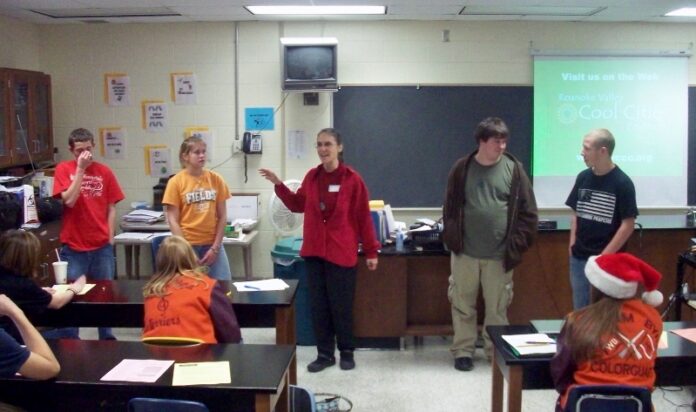
The City of Salem has officially declared May as Asthma Awareness Month, recognizing a problem that affects about 2000 adults and children in the city. Of course thousands are also impacted elsewhere in the area by the often poor air quality that hovers over the Roanoke Valley. Being located in a bowl with mountains on all sides doesn’t allow poor air to be easily swept away.
Salem city council member Lisa Garst presented an official proclamation about Asthma Awareness Month to Diana Christopulos, a Salem resident and current president of the Greater Roanoke Valley Asthma and Air Quality Coalition.
When making the presentation Garst also pointed out that asthma can be expensive: on average she said it costs about $6300 for an asthma-related hospitalization for a child between 0 and 4 years old. Often those children wind up in the emergency room – an expensive proposition.
Christopulos, an environmentalist and president of the Cool Cities Coalition, has spent many years educating people about poor air quality and cleaner energy that can keep coal-fired plants idle longer – spewing less particulates into the air. The Greater Roanoke Valley Asthma and Air Quality Coalition is “basically about Asthma and what you can do about it,” she says.
The coalition she added was started by pediatric doctors and nurses at Carilion who witnessed a steady stream of children coming in for treatment. It’s expanded to include health care professionals from all over the valley, “and environmentalists and businesses that are also interested in clean air.” The coalition focuses on both the causes of and treatments for asthma. “Clean air is a real big thrust for us,” said Christopulos. She calls asthma “practically an epidemic now.” 8% of all adults and 10% of all children nationwide she noted have asthma.
Cleaning up the air indoors (tobacco control primarily) and outdoors (vehicle exhaust, coal-fired plants and diesel fuel) is a target. The Coalition even has an asthma camp every summer for children impacted by the condition.
“Its fun but they also learn how to take care of their asthma,” said Christopulos. Carilion helps sponsor the camp. The coalition has also spent time with Roanoke City teachers and coaches, educating them on what a “bad air day,” looks like, and how it can impact students.
School nurses and clinicians are part of the Greater Roanoke Valley Asthma and Air Quality Coalition. “They can tell when it’s been a bad air day. People will have attacks and they’ll start showing up at their doctor’s office or at the school nurses office,” said Christopulos. Even well-meaning parents waiting at a school to pick up their children – with the car idling – are contributing to a condition that can make that child’s asthma worse. “It’s a really bad thing for [children] to be breathing that air.”
Smokers shouldn’t smoke indoors; get rid of as much dust indoors as you can. Take care of any mold – “one of the triggers for kids,” adds Christopulos. “Keep things clean…important things to do.” As for the big picture, using less electricity means less need for the coal-fired power plants that keep the valley powered to be fired up – spewing fewer particulates into the air. Keeping thermostats in a reasonable range “makes a difference in how much energy is used.”
The American Lung Association just released a report saying that half of all people in the country live in places where the air quality is poor. The Coalition has been educating local governments about the condition and Salem, Roanoke City and Roanoke County have all declared May as Asthma Awareness Month.
The localities have worked together on an early warning system for ozone and Christopulos said since the late ‘90’s “our ozone levels in this area have gone done significantly. More of a problem now is particle pollution. Its dangerous to lungs.” She doesn’t have asthma but is affected by airborne particulates.
20 of the valley’s 21 bad air days last year came from particulates – not from high ozone levels, according to Christopulos, who hopes that Asthma Awareness Month sheds more light on the issue – and what people can do about it. “You don’t have to be afraid of asthma,” she adds, “[but] you have to be aware of the asthma and how to deal with it.”
By Gene Marrano


